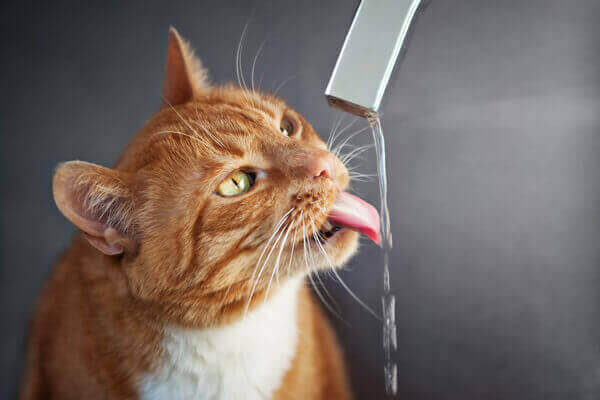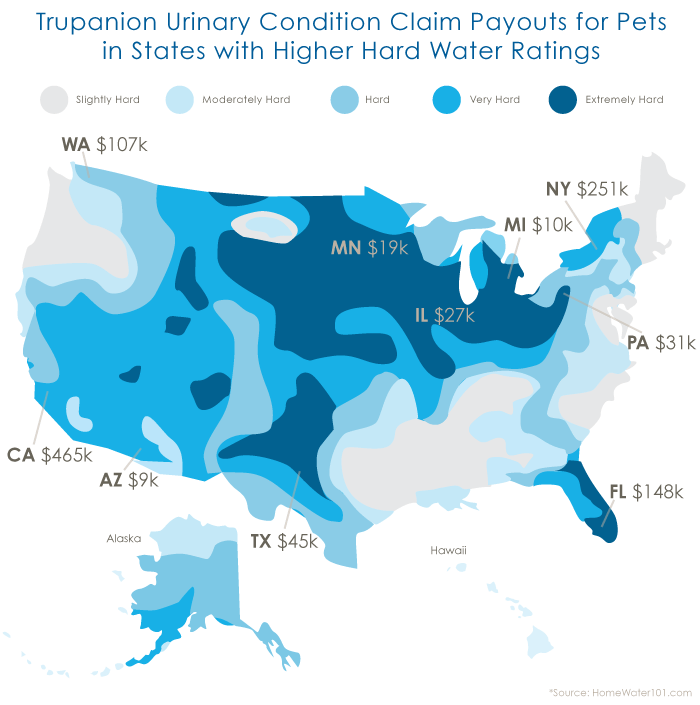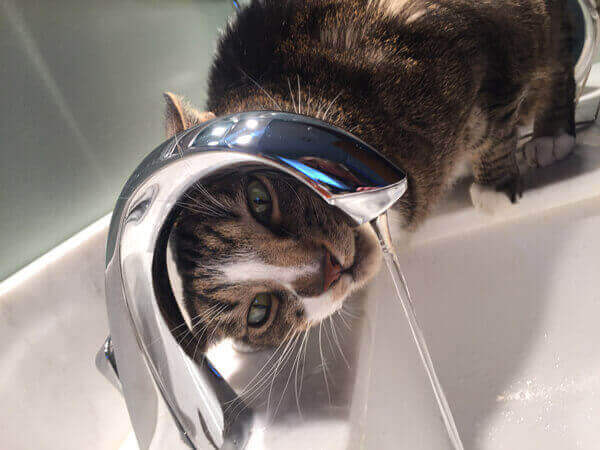
Is Your Furry Friend Safe? How Water Contaminants Affect Your Pets’ Health
Are you giving your pet a fresh bowl of water straight from your tap? That bowl of water might not be as fresh as you thought. If you wouldn’t drink your tap water, your pets shouldn’t either.If you do not have a system in place to soften and remove contaminants from your water, you could be stunting the growth of your dog or cat and exposing them to dangerous chemicals.
Hard Water Effects on Dogs and Cats
Magnesium and other alkali earth metals accelerate water hardness when these minerals are present near your water source.
Calcium, on the other hand, is an element that naturally exists in water. The source of calcium in water is rocks such as limestone, marble, calcite, dolomite, gypsum, fluorite and apatite that have dissolved into the water. Like magnesium, calcium is a determinant of water hardness.
 While there is no conclusive evidence suggesting pets could be harmed by drinking hard water, a 2016 Trupanion study found a relationship between medical claims for pets with urinary issues and areas of the United States with very hard water.
While there is no conclusive evidence suggesting pets could be harmed by drinking hard water, a 2016 Trupanion study found a relationship between medical claims for pets with urinary issues and areas of the United States with very hard water.
Trupanion’s study concluded that in areas with extremely hard water, cats – especially males – were three times more likely to have urinary complications than male cats in areas with lower levels of hardness.
Dogs aren’t in the clear, however. While dogs don’t develop kidney stones from hard water, they can be exposed to struvite or calcium oxalate stones. These stones can harm the bladder and lead to your dog getting a urinary tract infection.

Tap Water And Pets: A Guide to Potential Contaminants
LeadLead is a toxic metal that is very unsafe to consume. If there are excess amounts of lead present in your water system, your pet will be affected. Water isn’t the only source of lead poisoning but it is one of the most frequent.
Common symptoms of lead poisoning include stomach pain, diarrhea, and vomiting. If pets are exposed to lead for a longer period of time it may cause neurological symptoms such as seizures. They may also experience fatigue, poor appetite, extreme anxiety, blindness and other changes in behavior.
Chlorine
 Chlorine is purposefully dissolved into the water at treatment facilities across the country. They add this chemical in the water that goes to your home because of how effective it is in killing pathogens.
Chlorine is purposefully dissolved into the water at treatment facilities across the country. They add this chemical in the water that goes to your home because of how effective it is in killing pathogens.
Chlorine levels up to 4 milligrams per liter in water are considered safe for human consumption. However, areas that have a high bacteria count in their source water tend to use more, leading to the increased likelihood of chlorine contamination in your water.
It is very probable that the health issues that chlorine causes in humans are similar to the issues it causes in our pets. If your pets drink water with high amounts of chlorine, they might experience GI irritation, red eyes and itchy skin.
Iron
Iron is a natural element that tastes metallic in high concentrations. Small amounts of iron are safe for your pets to consume. However, higher amounts of iron in your water may cause symptoms in your pets such as diarrhea and vomiting, pain and swelling in the abdomen, loss of appetite, low blood pressure, and fatigue.
 Nitrates
NitratesWater that is high in nitrates is most common in water sourced from a well because it is often exposed to soils with this contaminant. The health risk of over-exposure to nitrates in your pets include abdominal pain, frequent urination, diarrhea and other signs. Other symptoms include tremors, coma and occasionally convulsions.
What to Do If Your Pet Is Drinking Contaminated Water
It is extremely important that you test your water for contaminants that could be affecting your pets’ health.Our pets are our best friends. We are responsible for maintaining their health while they keep a smile on our faces. Whatever water solution you choose to install in your home, remember it’s on you to keep them hydrated and healthy. Ensure your pet is protected from unhealthy water by knowing the signs of contaminated water and acting fast, so you can keep them away from the vet and safe in your arms at home.

The Effects of Hard Water on Your Skin and Hair
Hard water is known for leaving mineral trails in its wake. From crusty faucets to stain rings around toilet bowls—wherever hard water goes, remnants stay behind long after the water has drained. You may already know that calcium and magnesium mineral stains are slowing down the efficiency of your home, but the effects of hard water can also show in your skin and hair.The Effects of Hard Water on Skin
Warning signs of hard water include:| Dry and Itchy Skin | Stiff and Tight Skin |
|---|---|
| Increased Sensitivity | Amplification of Existing Eczema or Psoriasis |
Persistent dry skin and itchiness is a common symptom of hard water. Dry skin may be caused by high mineral content found in hard water, as these minerals strip your skin of natural oils that would otherwise keep your skin healthier and moisturized.
Hard water also prevents soap from lathering correctly and you will likely notice fewer suds in bathwater. This can lead to soap scum staying on your body even if you think it has been washed away. The soap scum can clog your pores, leaving your face susceptible to acne breakouts.
When your skin is dry, this can lead to skincare issues. It’s important to keep your skin moisturized, but if you use hard water your skin may dry out and feel tight. You’re also more likely to be left with bumps and razor burn due to hard water after shaving.
Researchers at the University of Sheffield have reported hard water igniting the development of eczema—a skin condition that leaves a dry, red rash on the body. Similarly, those experiencing psoriasis could see an increase in irritability when they use hard water.
It’s not just your skin feeling the negative impact of hard water, it’s also your hair and scalp.
The Effects of Hard Water on Hair
You may notice hard water affecting your hair through:| Fading color | Flat, dull and brassy hair | Increased dandruff |
|---|
Dandruff is a fact of life for many people. But they often treat the problem by using special shampoo and conditioner products to keep the flakes to a minimum. What won’t help, however, is washing your hair with hard water. The same minerals irritating your skin are likely worsening dandruff on your scalp. Hard water can also cling to your scalp’s natural oils, leaving your scalp feeling greasy even if it’s just been washed.
The effects of hard water don’t end on the scalp. Hardness minerals can build up onto the hair, resulting in less lathering and less effective cleansing. You’ll need to use more product to get the same result, so you’ll go through shampoo and conditioning products more often. Hard water can also fade new hair color treatments quickly and has been known to flatten perms faster.
No matter what product is being used, hard water’s effects are hard to mask when it comes to making your hair shine and your scalp healthy. This means more trips to the salon and increased stress on your self-care budget.
Challenges Affecting Personal Hygiene & Your Bathroom Routine
Dull hair and itchy skin are only the beginning of the personal hygiene challenges related to hard water. The leftover minerals in your water could also create a difficult experience for you in your bathroom.Everything from residue stains on your shower to the white crust around your sink’s faucet could be from hard water. Mineral buildup in your home’s plumbing from unsoftened water can also cause weak water pressure to your showers and faucets. Even your fading, scruffy towels can be caused by the washing machine using hard water.
How to Protect Your Skin & Hair From Hard Water
By now, you can understand the widespread effect hard water has on your skin and hair. Specialty lotions and new hair products may help minimize the effects of hard water on your skin and hair, but a water softener will eliminate the issue at the source. Water softeners remove the hardness minerals from your water before they reach your showerhead (and the rest of your home) so you can take control of your beauty routine.Leave skincare and dandruff issues in the past. Experience softer, healthier skin and hair by installing a water softening system in your home.


